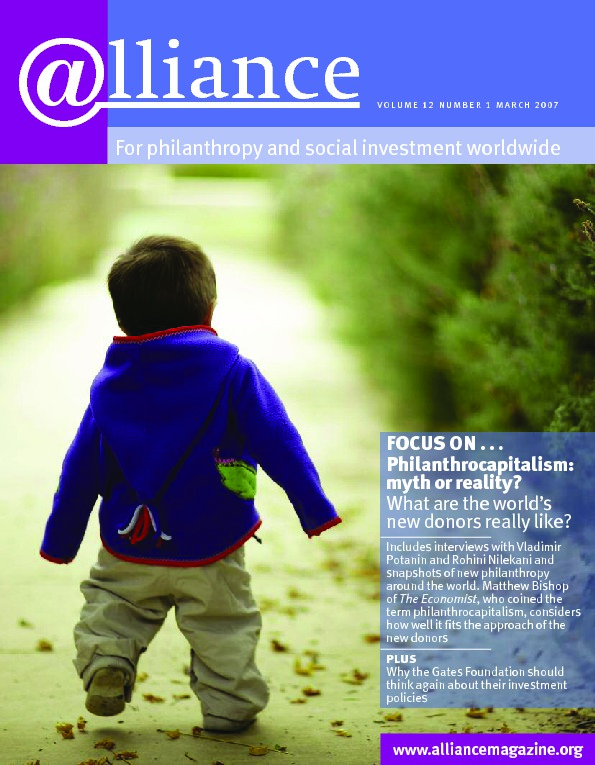Registered in 1999, the Vladimir Potanin Foundation was Russia’s first private foundation. Its budget is financed with the personal assets of Vladimir Potanin and those of the Interros Company. Its mission is to help realize the potential of the most active, talented and educated young people as the most promising resource of Russian society, as well as to support social and cultural innovations. The Foundation annually awards over 2,300 scholarships and 400 grants.
Vladimir Potanin is personally committed to improving the environment for philanthropy and has used his influence to lobby for the recently passed law on endowments. Alliance talked to him about his role as a prominent Russian philanthropist. Asked if he sees himself as a philanthrocapitalist, he says that he sees the Foundation’s activities as ‘social investments’ and philanthropy as a ‘strategically systematic activity’.
Do you see yourself as a philanthropic leader and innovator in Russia? What do you think is most innovative about your philanthropy?
I have never aspired to be the leader of Russian philanthropy. I’d rather think it’s a goal for the managers of the Foundation. My dream is to make philanthropy both efficient and at the same time enjoyable for me personally. I deem it very important to support the most active and educated young people of our country. It’s not a matter of just giving them money, but of giving them something more, of making them understand that their success is required by society, in order to enhance their motivation. Some interesting technologies have been discovered, which we hope will become a catalyst for the professional and personal development of participants in the Foundation’s programmes. These technologies are based on multiple-stage contests and business games, which allow the participants to reveal their internal resources and capabilities.
Do you think Russian philanthropy can play a role in improving the image of Russian business – or even of Russia more generally – in the West?
No doubt about it. The country’s image depends on its people and their deeds. Nowadays we have in Russia a class of people who have become rich and self-sufficient. They feel a natural need to do something good for the others, to share their success, to create a favourable image. We have learnt how to help, but we still face the need to institutionalize philanthropy, to make it compatible with international standards. I feel that to make our image abroad more credible it is important to gain the respect of our own citizens. However, existing stereotypes and the lack of information have created great problems. The Commission on Philanthropy which I chair in the Public Chamber considers it a prime task to involve massive popular support in spreading information about philanthropy.
Do you see yourself as a ‘philanthrocapitalist’ or ‘new’ donor?
I have never viewed myself in such a way – though within the suggested framework I feel I am a ‘new’ donor and we have been identifying our activities as ’social investments’. Our aim is not just to donate money but to stimulate further development in our recipients. This is quite an ambitious task. One should not embark on this path without using a professional managerial approach.
We have established a special foundation and we are inviting partners to work with us. Tens of thousands of people participate in our grant competitions. We have clearly identified what a person should gain by participating in our programmes, notwithstanding whether this person wins and gets our grant or scholarship or fails. We cherish the desire to participate.
All this is of tremendous interest for me, particularly since many things are being created from scratch. Philanthropy in Russia is being established ‘Here and Now’. Everyone who embarks on this path has a chance to implement their own creativity.
My credo is that new philanthropy is a strategically systematic activity aimed not at distribution of money but at creation of new mechanisms and conditions for human development. What I dream of is a situation where every human being gets every incentive, and we all prove ourselves and help others to prove themselves. Maybe this goal is unattainable but the resolution to achieve it allows us to gain important intermediary results.
For more information
http://eng.fund.potanin.ru/about





Comments (0)